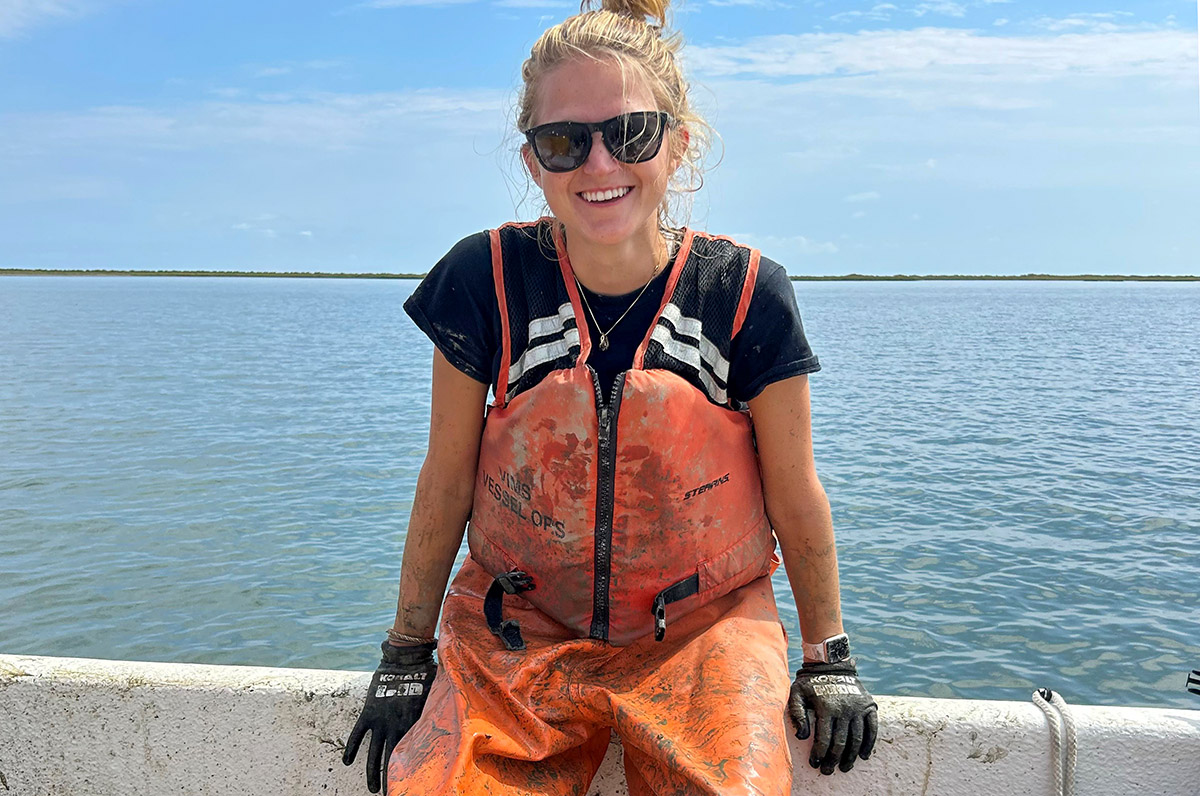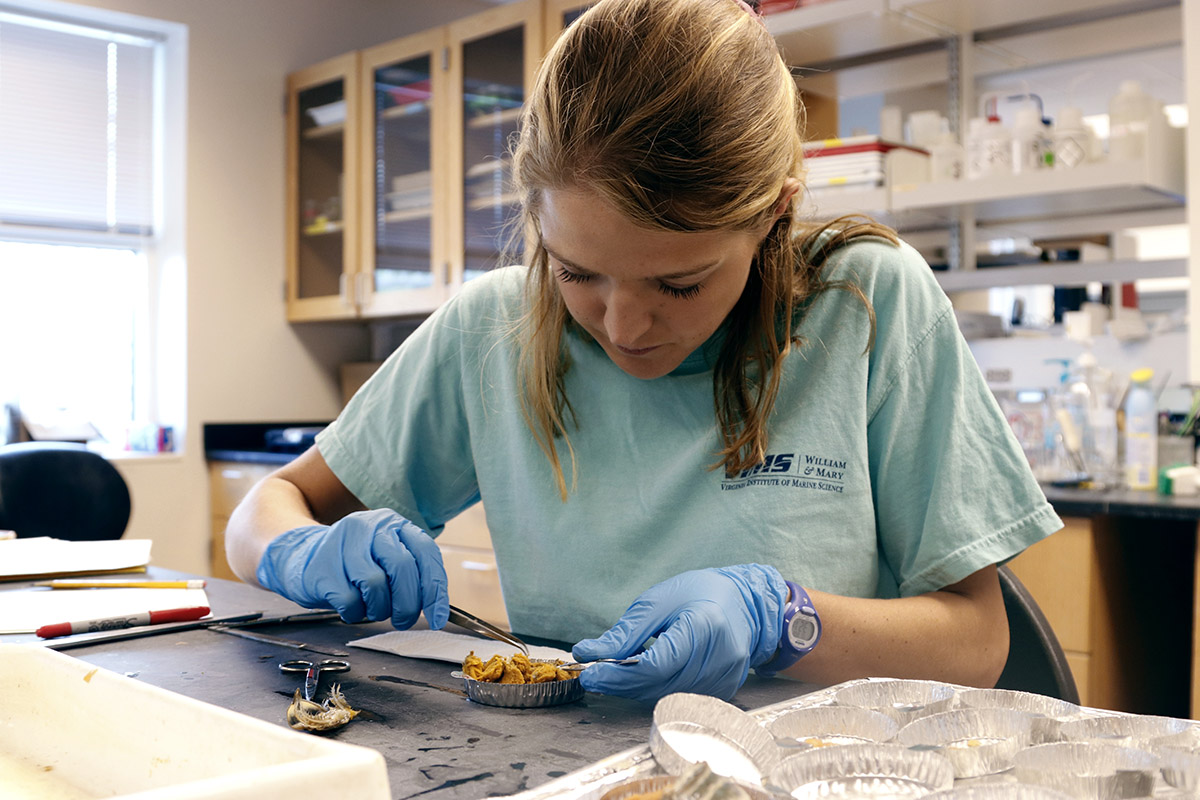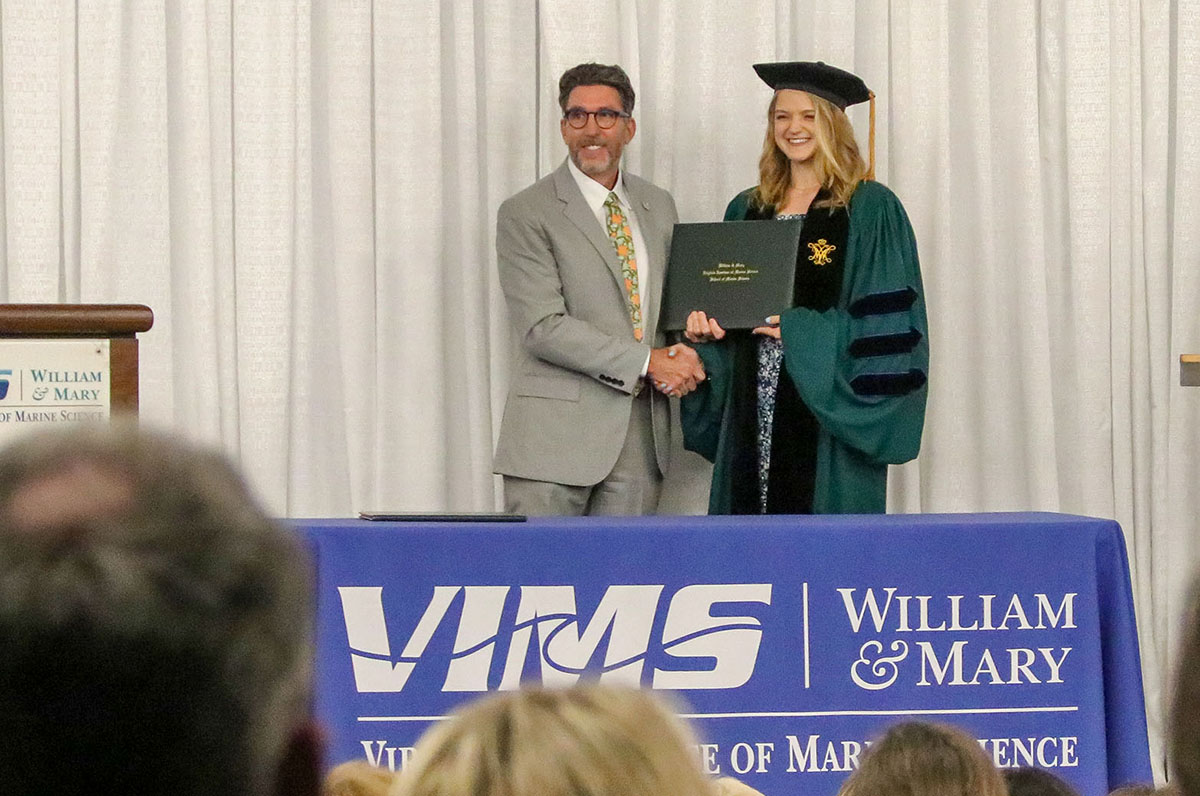From decades of decapods to offshore energy, Alex Schneider’s fisheries expertise to inform the U.S. Department of the Interior
 Reflecting on advice for others interested in a similar path, Ph.D. graduate Alex Schneider considered the evolving nature of science.
Reflecting on advice for others interested in a similar path, Ph.D. graduate Alex Schneider considered the evolving nature of science.
“Science is so flexible and fluid that it’s important to stay open-minded and take advantage of the opportunities that come along,” said Schneider. “Having a general framework for what you want to do is helpful, but doing what feels exciting and right at the time is also important.”
This mindset benefited Schneider during her Ph.D. journey at VIMS.
“I think marine science was a bit of a curveball for my family,” said Schneider, who grew up in a small landlocked town in Northern Connecticut but fell in love with the ocean visiting her grandparents in Rhode Island. “But, it makes sense. I always had my head and my hands in the water. I would collect snails and did a lot of fishing and crabbing with my dad as a kid, as well as a lot of sailing.”
Schneider attended Villanova University, earning her undergraduate degree in environmental science. While at Villanova, she participated in the Research Experience for Undergraduates (REU) program through the National Science Foundation (NSF) at Rutgers University as well as a research experience at the University of Gothenburg in Sweden. Her experience at the Rutgers University Marine Field Station solidified her desire to specialize in marine science.
“I was doing a fisheries survey on a boat, and it was one of those lightbulb moments where I realized: ‘This is everything I like to do for fun, why not keep doing it?’” said Schneider.
Through the connections she made in the REU, she attended an American Fisheries Society conference, where she met one of her future co-advisors, VIMS Professor Mary Fabrizio.
“I was doing blue crab research in New Jersey, and a lot of the literature I was reading was coming from research in the Chesapeake Bay conducted by VIMS,” said Schneider. “I met Mary at the conference and thought, ‘I want to be her when I grow up.’ So, I followed her around until she gave me the time of day.”
The summer before she became a student at VIMS, Schneider came to work on the Juvenile Fish Trawl Survey led by Fabrizio.
“I remember finding this mature female crab that was super small and thinking that it was so weird. I dug my head into the literature to learn more, and I came to realize that key aspects of female blue crab reproduction were a wide-open field with many unknowns,” said Schneider. “There was a lot of literature from when their populations declined in the early 2000s, but then not much after they began to recover. There was so much change in that interim period to explore.”
After her experience on the Fish Trawl Survey, she knew she wanted to focus on mature female crabs. Initially, she was hoping to explore connections between climate change and its impacts on blue crab reproductive output in VIMS’s Seawater Research Lab. Unfortunately, the COVID-19 Pandemic occurred during her second semester and made the experiments too difficult to manage.
Schneider followed a master’s bypass track on her way to her Ph.D. She had several milestones she needed to achieve in order to be accepted into the Ph.D. program. After several years as a master’s student, she officially entered the Ph.D. program after passing a comprehensive exam and having her application reviewed and approved by an academic council.
 Her Ph.D. dissertation shifted to comparing various factors from when the blue crab population was in poor shape in the early 2000s against the subsequent rebound. She completed four chapters on the topic, two of which have been published in academic journals. Her third chapter is currently under revision, and she hopes to submit her fourth chapter for publication soon. She was also involved in another, unrelated publication based on work she completed with a William & Mary undergraduate under the direction of VIMS Professor Jeffrey Shields.
Her Ph.D. dissertation shifted to comparing various factors from when the blue crab population was in poor shape in the early 2000s against the subsequent rebound. She completed four chapters on the topic, two of which have been published in academic journals. Her third chapter is currently under revision, and she hopes to submit her fourth chapter for publication soon. She was also involved in another, unrelated publication based on work she completed with a William & Mary undergraduate under the direction of VIMS Professor Jeffrey Shields.
In addition to journal publications, Schneider secured a Virginia Sea Grant Graduate Fellowship as well as a Willard A. Van Engel (WAVE) Fellowship. She also had the opportunity to travel to a number of conferences across the U.S. as well as the 2023 International Conference & Workshop on Lobster (and Crab) Biology and Management in Fremantle, Western Australia.
“Fisheries conferences tend to be focused on finfish and bivalves,” said Schneider. “So, for me, being in a crab and lobster meeting was like being a kid in a candy shop, or at least a nerdy version of that.”
Schneider is also proud of the opportunity to help others during her time at VIMS. For several years, she was the student co-lead for the VIMS chapter of the Society of Women in Marine Science. Partnering with VIMS’s diversity and inclusion committee Dive-IN, she helped secure a grant through the W&M Society of 1918 that created mentorship opportunities for five VIMS students.
“It provided funding that allowed the students to travel and meet W&M and VIMS alumni from across the country who specialize in areas that aligned with the students’ interests,” said Schneider. “It can be hard to bring a number of diverse experts from around the country to VIMS, so we created opportunities for students to establish relationships that will hopefully propel their careers.”
Schneider credits support from faculty and peers at VIMS for her success, especially her co-advisors Fabrizio and Professor Romuald Lipcius, as well as Shields, who was on her graduate committee.
“We have advisors who help you through your degree program, as well as a graduate committee that is involved in all of your milestones and sort of acts as an advising group,” said Schneider. “I definitely didn’t understand the importance of committee members before I started working toward my milestones.”
 Next, Schneider will be moving to Northern Virginia to work for the Bureau of Ocean Energy Management in the U.S. Department of the Interior. Starting in June, she will be evaluating fisheries related to offshore renewable energy programs in the Atlantic.
Next, Schneider will be moving to Northern Virginia to work for the Bureau of Ocean Energy Management in the U.S. Department of the Interior. Starting in June, she will be evaluating fisheries related to offshore renewable energy programs in the Atlantic.
Looking back at her time in graduate school, it’s not just the science or the animals that stand out.
“Whether it be students, the people in the lab, the faculty or the administrators, I’ve met some of my favorite people here at VIMS. I feel like nearly everyone you meet wants to help you. VIMS is a community,” said Schneider.
